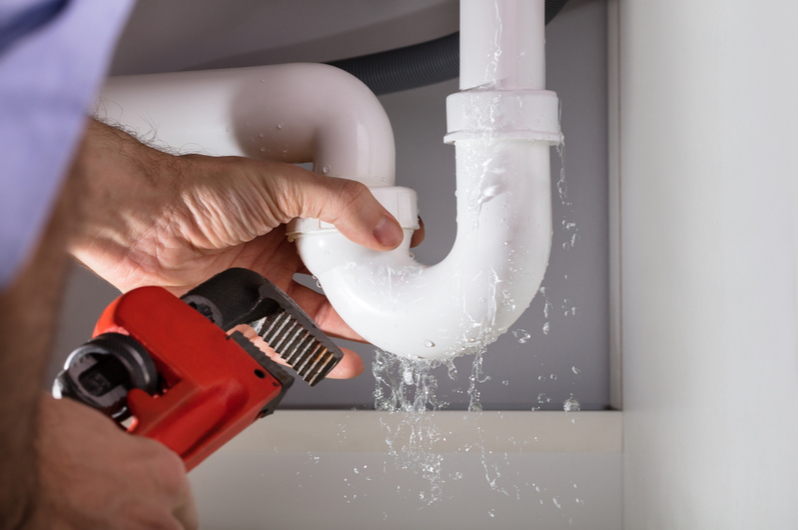The national average cost to restore a small, water damaged bathroom, is $3,000. This price is something to keep in mind when you consider making plumbing repairs yourself. Emergency service costs can vary by hundreds of dollars, making DIY tempting. If you take a little time to educate yourself, learning the basic tasks you can tackle, you can keep costs lower.
However, there may come a time when a professional is required, and it is important to admit limitation before disaster strikes. It is usually in the middle of the plumbing crisis, and several trips back and forth to the hardware store, that you figure out the task is too daunting. By that point, the situation is worse, and plumbers are likely to tack on rates commensurate with the desperation at hand. Find out which repairs are doable by the average homeowner, and when you should step aside for the plumber.

Know the Basics and When to DIY
Property owners should know the basic facts about a their home’s plumbing, such as where shut off valves are located and if they are accessible. In addition, homeowners’ DIY can include:
- Changing a washer. A dripping sink is a symptom that a washer is failing. A packet of washers that can accommodate most fittings in the home, runs less than five dollars. Knowing how to change one makes sense, rather than to call a plumber, who will likely charge $75 just for showing up.
- How to clear a basic blockage. There are simple hacks that can clear a drain, not all of them labor intensive or toxic. Many videos abound on YouTube for those. But when these pretty-much-proven methods fail, this is the sign you need to call in a professional.
- Preventative maintenance. Routine dishwasher maintenance and keeping the wrong things from going down your drain, goes a long way to preventing an emergency call to the plumber. Easy care instructions come with machinery and by adhering to the manufacturer’s advice you can often avoid serious plumbing issues.
None of these measures help at all if the basement backs up. Sometimes emergencies occur in outside lines, which are out of the skillset of the average DIY-abled person. So, in addition to the ability to perform basic common tasks, it is critical to be able to recognize signs of a serious problem and when a plumbing professional is a must.
Steps Homeowners Should Take in a Plumbing Emergency:
- Shut off the water.
- Call the water company and get direction from them. If it is a backup in the basement, the problem might be a municipal issue, not a private one.
- Call at least three plumbers associated with reputable licensed plumbing companies.
Note: It seems like a great idea to get referrals from neighborhood websites but for the sake of liability and being able to cover the work that is done, it is important that the plumber performing emergency work is licensed and insured.
Emergency Services and What They Include
Home Advisor is a directory of repair services that offers estimates for repair needed. By filling out basic information, this site directs the inquirer to services in their area and returns estimates almost instantaneously. Their information is based on research and public testimonials, so that the person in the middle of a plumbing situation is better informed and less at the mercy of a plumber who knows well the dire straits a plumbing emergency can create. Other similar sites include thumbtack, and Angie’s List.
Emergency Plumbing Services Best Left to the Professional
- Blocked main drain. A backed-up basement drain means no water from the dwelling is passing to the municipal sewer lines or to the septic tank. Clearing it requires a professional. Blockage is often caused by discarded products down the toilet or sink, or by tree roots, obstructing at a distance. This is beyond the capabilities of the average affordable equipment purchased at a hardware store. Even if such equipment is available, the professional is going to be far more adept at using the equipment than you are.
- Camera confirmation. An emergency plumbing service runs a camera down a blocked drain to confirm the cause of the blockage and thus identify the best course of action.
- Clear an impacted drain, in or out of the house. One of the worst offenders for a blocked drain is excessive food scraps down the garbage disposal. Except for the occasional organic matter, food waste belongs in the garbage. This includes paper products, like paper towels, which are the second worst culprit for plumbing emergencies. Professionals have augers and other equipment that do what a plunger and liquid drain clearer cannot.
Clear the roof vent. A professional discerns whether a backed up drain is due to outside obstruction or one caused by improper air pressure. Ruling out a blocked roof vent may result in a disaster worse than the initial one, if done DIY. A professional mitigates damage in these cases.